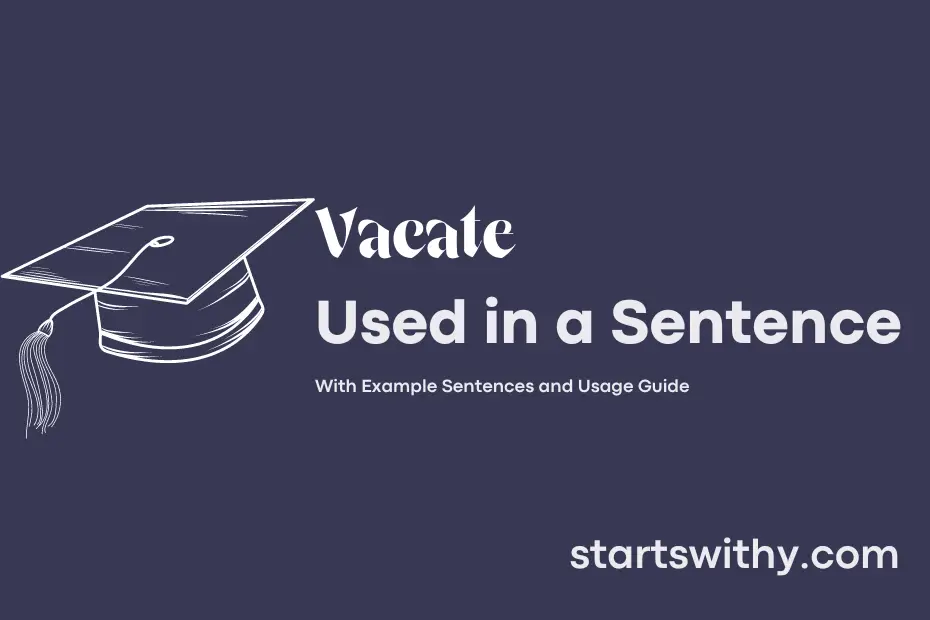Have you ever needed to leave a place or position suddenly? When you vacate something, you abandon it or leave it empty, creating a void once occupied by you. Vacating can apply to physical spaces, such as a home or office, or even to a role or responsibility.
When you vacate a space, you are essentially exiting or relinquishing control or possession of it. This act can be temporary or permanent, depending on the circumstances. Vacating can be a planned or unplanned event, but in either case, it involves leaving a particular place or role unoccupied.
7 Examples Of Vacate Used In a Sentence For Kids
- Vacate the swing so others can play.
- Please vacate your seat for the next student.
- It’s time to vacate the classroom for recess.
- Can you vacate the slide for a moment?
- Let’s vacate the sandpit and go back to class.
- Remember to vacate the swings after your turn.
- When the bell rings, we need to vacate the playground.
14 Sentences with Vacate Examples
- Vacate the library study room before closing time.
- Please remember to vacate your hostel room before the semester break.
- It’s important to vacate the classroom before the next lecture begins.
- Don’t forget to vacate the computer lab after you finish your assignment.
- The cafeteria will be closing soon, so make sure to vacate it on time.
- The parking lot needs to be vacated for the event happening tonight.
- As per the hostel rules, students must vacate their rooms during campus holidays.
- Remember to vacate the common area once you’re done with your group study session.
- The sports ground needs to be vacated for maintenance work.
- Before the academic year ends, all students must vacate their lockers.
- It’s courteous to vacate your seat in the classroom for the next batch of students.
- Make sure to vacate the seminar hall after the guest lecture is over.
- Due to the upcoming renovation, all students are required to vacate the designated area.
- The study lounge will be closing at 10 pm, so please vacate it before then.
How To Use Vacate in Sentences?
To use “vacate” in a sentence, start by understanding its meaning. “Vacate” means to leave a place that was previously occupied. When incorporating it into a sentence, make sure the context fits this definition.
For example, here is a sentence using “vacate” correctly: “The tenants were given a month’s notice to vacate the apartment before the new owners moved in.”
When constructing a sentence with “vacate,” ensure that it is used in the correct tense and form. You can use it in the present tense, past tense, or future tense based on the context of the sentence.
Here are some examples of using “vacate” in different tenses:
– Present tense: “Please vacate the premises immediately as they are closing for the day.”
– Past tense: “The guests vacated the hotel room in the morning before check-out time.”
– Future tense: “They have to vacate the building by the end of the month due to renovations.”
Remember to always ensure that the sentence structure is clear and that the use of “vacate” aligns with its meaning. With practice, you will become more comfortable incorporating this word into your vocabulary effectively.
Conclusion
In conclusion, the concept of vacating premises is crucial in contexts ranging from legal matters to property management. Vacating a property involves leaving or surrendering it, as seen in sentences like “The tenants will vacate the apartment by the end of the month” or “You must vacate the premises immediately.” This action is commonly associated with moving out, terminating a lease, or obeying court orders, as demonstrated in sentences such as “The court ordered him to vacate the property within 30 days” or “They vacated the office space after the lease expired.”
Understanding the significance and implications of vacating premises is essential for individuals involved in real estate, rental agreements, or legal disputes. By comprehending the meaning conveyed in sentences with the keyword “vacate,” individuals can navigate various situations that require them to leave or relinquish a property effectively.



